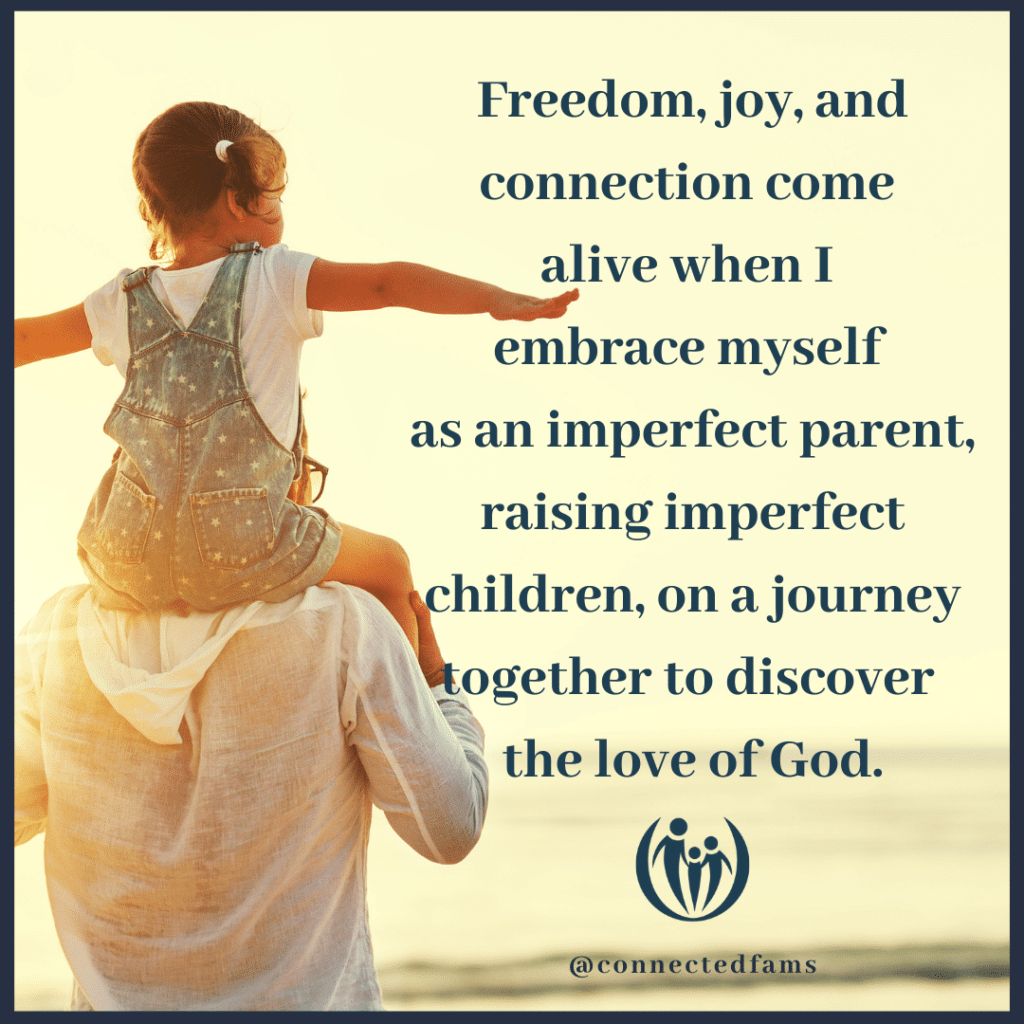
Here’s How to Seize the Opportunity When Your Child Feels Distant

“My daughter is distant from me.” How often have parents repeated these words? Or maybe it’s your son that is emotionally distant these days. The truth is, all relationships hit low points at times. For some kids, distance is their default means of coping. Perhaps you’ve even been struggling with feeling distant from your child for months. Or even years..
So now, you just… try harder, right?
But if you’re really stuck, you know just “trying harder” doesn’t cut it.
Trying harder often misses the mark, because there’s usually more going on than meets the eye. Pretending that all is well may only perpetuate these troubles.
In order to make real progress, we need to stop “trying harder” and look under the surface to address the real roadblocks — could it be your own discouragement, exhaustion, awkwardness, disappointment, and resentment, or even your own feelings of disconnection?
The good news is, when your child is most distant from you, you have a unique opportunity to demonstrate God’s unconditional love and patient pursuit.
Let’s start with the easiest part to understand…you.
Practice contentment
Everyone has dreams for themselves and their children. Sometimes those dreams don’t come true. Embracing reality in the light of God’s truth gives us hope. Perhaps you’re a musical parent who has an athletic child (or vice versa). Or you might be a parent who imagines having focused, compliant children and instead has a crew that is intense, rambunctious, and climbing-the-walls.
If your son or daughter is distant from you, maybe they feel like they’ve disappointed you. Think through what dreams you’ve had for your child and how your child may or may not feel like they’re fulfilling those dreams.
You might butt heads with a child that is just like you (usually strong-willed), but more often parents struggle with the child who is quite different from them. You might say, “I just don’t connect with this child. We are so different.”
These thoughts can lead to disappointment in your child. You may find yourself putting more energy into encouraging your child to, in some way, fulfill your expectations. This can lead to your child feeling like a disappointment, and they may choose emotional distance over facing your disappointment.
It’s not just disappointment in your child you have to pay attention to
Disappointment in your child might be less of a factor, per se. Instead, you might be pretty hard on yourself, believing, “I am just not cut out to raise this child.”
The truth is, you’re really disappointed with yourself.
Of course, your child doesn’t know this. And to complicate matters, the disappointment with yourself and disappointment with your child often intermix.
Ugh.
The key to a new mindset about all this is to let go of the dreams and accept yourself and your child, roses, thorns, and all!
Let go of dreams and embrace reality:
- Accept the reality that neither your child nor you can (or ever will!) get it entirely right.
- Accept that parenting is not what you expected. This may mean you let go of a false standard for yourself, or grieve as you release hope for the “child of your dreams.”
- Learn to get your self-worth not from your children’s behavior but from God’s delight in you.
- Embrace core beliefs in line with Scripture: This child is created in God’s image, fearfully and wonderfully made, and created for eternally valuable purposes.
- Realize (perhaps more difficult to believe) that you are a gift to your child, uniquely matched to your child for God’s good purposes, even when, especially when, your child pulls away and is distant.
Side note: These realities are true for all families, but during this Adoption Awareness Month, if you are an adoptive family, know that we see you and we’re here for you. You are not alone.
A good friend of ours had young children wired similarly to our children: intense, hypersensitive to sensory experiences, and exceptionally active. It was hard, but he became more peaceful when he determined to live by the truth that, “Our children will struggle, but we are going to be okay. Jesus is enough.”
As this statement became a core belief, it transformed his relationship with his children.
Freedom, joy, and connection come alive when you embrace yourself as an imperfect parent, raising imperfect children, on a journey together to discover the love of God.

Prioritize true connection as a family
Galatians 5:6: “The only thing that counts is faith expressing itself through love.”
Love rooted in faith is the core of healthy relationships with children!
Families are stronger when parents “drive a stake in the ground” about this priority of connection —true, real-life connection—to God and with each other, and then with their children.
How do we define connection? To know, understand, accept, and enjoy your children in ways that can’t be misunderstood. It is the glue that strengthens families. It also requires a lot: commitment, time, insight, vulnerability, and perseverance. But from this place of strong connection, children are equipped to connect well to the world around them.
However, it’s difficult when your child is willfully distant from you, isn’t it? If you’ve got a son or daughter, who is emotionally distancing themselves from you right now, that’s all the more reason to prioritize connection.
But it’s not about how you get them to respond. It’s about how you show up. Demonstrate unconditional love by continuing to value the relationship and connection. Remain steadfast. Stay non-defensive and peaceful, even if they pull away.
To strengthen connection with a child who is distant, consider taking these steps:
- Ask each of your kids: “What do I do that makes you feel most loved? I want to do that more.”
- Learn how to appreciate and guide the gifts-gone-awry in your kids. Instead of driving you crazy, or pushing your child away, those gifts can inspire you to cultivate God’s purposes for your kids when they struggle.
- Talk with your kids about the priority of connection, and grow your identity as a family of learners. It is God who is teaching you how to love each other! 1 Thessalonians 4:9 says “…you yourselves have been taught by God to love each other.”
- Determine not to let resentment build when things are tough, especially if you struggle with a particular child. Instead, do something fun or affectionate after a difficult interaction. When things get messy and hard, go back to the “stake of connection” and regroup! Ephesian 4:32 says, “Be kind and compassionate to one another, forgiving each other, just as in Christ God forgave you.”
We explicitly taught the value of connection to our kids
There were many intense moments in the Jackson household. We believed (and still believe) that connection with God and with each other was primary. That became the “ballast in our boat” that kept us balanced, and righted us when we tipped in a storm.
We prioritized, practiced, and discussed with our children the importance of connection and even explained the early version of the Connected Families Framework to them. They began to adopt the same conviction about the priority of connection.
After a particularly intense conflict with Lynne, our then 12-year-old said to her, “Mom, we’ve been mad at each other a lot this morning, so I think we should go play tennis together.” As teens, if our kids had a conflict, they habitually reconnected – by going out for a coffee treat or having some other form of fun together.
Connecting to that distant child is how you demonstrate God’s love
The place of embracing reality and prioritizing true connection is the place you repeatedly go if you are to grow as a parent. Build your foundation for parenting on God’s infinite value of you, not on how well your child lives up to your “dream child” hopes. Then you can embody the unconditional love of God to your child (even that child who is distant). What higher calling is there?
If you feel particularly stuck, consider contacting us about our parent coaching to get some one-on-one help.
What are your parenting strengths?
You’ve got them. Knowing your strengths will help you become the best parent you can be. Knowing your parenting challenges is useful information too. Take our FREE ASSESSMENT.







